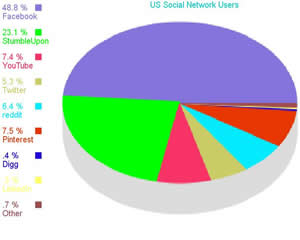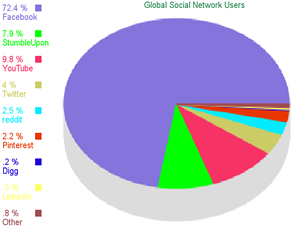Which Social Network is Really Social?
By Gaurav & Brook Bhagat

How is Facebook like a refrigerator? When you’re bored, you keep opening it, thinking you’re going to find something good… even though you already know exactly what’s in there.
Ba dum bum. It seems like there’s no way out these days: if you want to communicate with the younger generation, succeed in business, or even understand the jokes on late-night TV, you’ve got to be on Facebook or another social network. The days of pen pals and postcards have been replaced by instant messaging and video chats on Yahoo, Facebook, Skype or MSN. The days of paper mail may be numbered, and we have to face the music—or lack thereof—of social networking.
So, which social network should we use, and why? Almost any small business owner will tell you that, to compete in today’s market, you’ve got to have a website and corresponding social network pages to get referral traffic. So what are your options? Here is a detailed comparison of a few:
Facebook (Blue Planet Journal on Facebook)

Facebook currently owns more than 70% globally and, in the U.S., a little short of 50% of the social networking market share, leaving all other competitors trailing way behind them. However, this may not always be true. Before September 2012, Facebook worked amazingly well to get in touch with family and friends as well as “fans”—a.k.a. potential customers or website visitors-- if you had a Facebook page. But ever since changing their so-called Edgerank algorithm, things have been down. What this means is that before, if you “liked” a Facebook page, all the posts on that page’s wall automatically showed up in your news feed, or “home page,” unless you took some action to “hide” them; no longer. Now, unless a fan takes specific steps (that are not highly publicized by Facebook) or “interacts” with a page to a certain extent, liking and/or commenting on posts, it will slowly disappear from his or her news feed. Pages with tens of thousands fans, which had a “reach” (number of views) of thousands per post before, have seen a steep decline in this reach. It’s rare now to reach even 5% of the fans on most posts. It seems to be the same for individual accounts, in which your friends and family don’t see what you post in their news feeds.
The most recent quarter was one of the best yet for Facebook stock. On the quarterly result day, Facebook stock climbed a whopping 30%. It was a great day for shareholders, but probably bad news for the users. By cutting down their reach, Facebook had effectively given a message to individuals and page owners: it’s not a free platform anymore. Now, if you are a small business, blog or website owner, you have to pay up to “promote” every post so your fans can see it. The irony is, if you paid for a Facebook ad to get those fans, you are actually being asked to pay a second time to reap the benefits of the ad you already paid for. You are now the cash-cow for Facebook, obligated to pay up for every post to reach your own fans. Unfortunately, small blogs and website owners who do not charge anything from their readers as a subscription fee don’t have the budget to become Facebook’s cash-cow, and the result is that those people have started looking for alternatives.
Users, too, wonder what has happened to the posts from the pages they have already “liked.” A recent poll on Yahoo finance asked users which social network they preferred. About a third of them said teenagers used to use Facebook, but had moved on.
Google+ (Blue Planet Journal on Google+)

Google+ is a new player in social networking, and currently doesn’t stand anywhere close to Facebook in terms of the social network market share, but it’s gaining momentum. So far, we can’t find any negative point in it. A post from a Google+ page or personal account seems to display in everyone’s feed (correct us if this is not true). The advantage of Google+ is their +1 button. This is similar to Facebook’s “like” button, but when Google+ users click it, on a news feed or page post on Google+ or on a web page, the post seems to get some preference in an “organic” Google search.
Google+ seems pretty user-friendly and has “circles,” in which users can break down contacts in different groups and share selectively, similar to Facebook’s lists, but on Google+ it’s easy to find large groups of people with similar interests, making it perhaps more functional and unique to blog/site owners. For example, you can make different circles named ecology, travel, meditation etc. and share related posts with specific circles, so only the people who most likely to want to see it will get it. Google is a multinational corporation with almost endless resources, and, over time, Google+ may become a tough competitor for Facebook.
Twitter (Blue Planet Journal on Twitter)
Twitter has about 5% of the market share. It’s a good way to get the word out about a website or business, but has limited functionality. It’s restrictive in some user functions—in the length of posts obviously—but tweets seem to go in every “follower’s” feed. This gives users a chance to decide if they want to click a link or not in the tweet— compared to Facebook these days, which has decided that for the users.
Others (Blue Planet Journal on Pinterest and Tumblr)

Although there are many more small social networking platforms like Pinterest, Tumblr and Stumbleupon, there are none which seems to challenge Facebook’s crowning achievements yet. Stumbleupon is the biggest contender so far in the U.S., with almost a quarter-sized slice of the market. This platform has the fun, magic eight ball-like feature of the “stumble” button, which selects pages for users to view based on their interests, and may be responsible for its success. It “learns” your preferences in pages the way Pandora learns your preferences in music. It doesn’t seem too accommodating to small business or website owners, though, and the design is not that attractive.
Pinterest and Tumblr, on the other hand, are beautiful to look at. They both work well as blogs and have lots of user-friendly features. Tumblr has many attractive page layout options, both free and for a price, rather than the one-size-fits-all feel of Facebook or Twitter. Pinterest, emphasizing art and pictures, caters to a more visual crowd, and would be excellent especially for businesses like photography, real estate, or art dealers. You can directly link your website to both of these networks and import links showing your content on their platform, or make a stand-alone blog for personal use.
Zurker Update: Zurker has decided to stop the promotion of giving refferal vshares after August 31, 2013.
Disclaimer: we get one vshare if you join Zurker using this link
Zurker is another small player which is unknown to the masses. It’s unique in its own right because it’s owned by its users. When you make an account on Zurker and get your sponsor link (like the one above) and use it to promote the network, you get 1 “vshare” (virtual share) per sign up, which is an added benefit. Currently, a vshare is not worth anything in real money terms, but Zurker’s goal is to go public in the future and issue real shares for vshares. It’s an interesting and democratic idea which gives power to the users to own the network, vote on network issues and share the success if it becomes a powerful social network in the future.
Zurker is pretty user-friendly too, except it takes a while to get to know all the options available there. But as a work in progress, it seems awesome and has many unique user tools in it. It doesn’t have anything which is page equivalent to Facebook or Google+, but the personal accounts seem to work pretty well as per reach.
Conclusion

The media was quick to give social networks, meaning largely Facebook, some credit for the “Arab Spring,” and rightly so. Facebook had provided a free platform for grassroots activists to connect and communicate quickly. With the changed algorithm, however, I wonder if such a phenomenon would have been possible, and I wonder who else can no longer communicate with their community because they can’t afford to pay to “reach” them. Maybe the new Facebook is more profitable for now, but at what cost?
Finally, you ask, what about the argument that it will be impossible for any number of great features on another social network to compete with the fact that there are so many people on Facebook already? Well, history can answer that with one word: Myspace… ba dum bum.
Charts Data Source: Global website traffic reported by Compete, Nielsen-Net, Alexa, seoMoz, StatsCounter - GlobalStats, and Karma Snack's Snackfolio traffic anlytics
Did you like the article? Subscribe here to our New Article Email Alert or RSS feeds.
Sharing is caring! Don't forget to share the love, and keep the conversation going by leaving a comment below:
Advertisement
